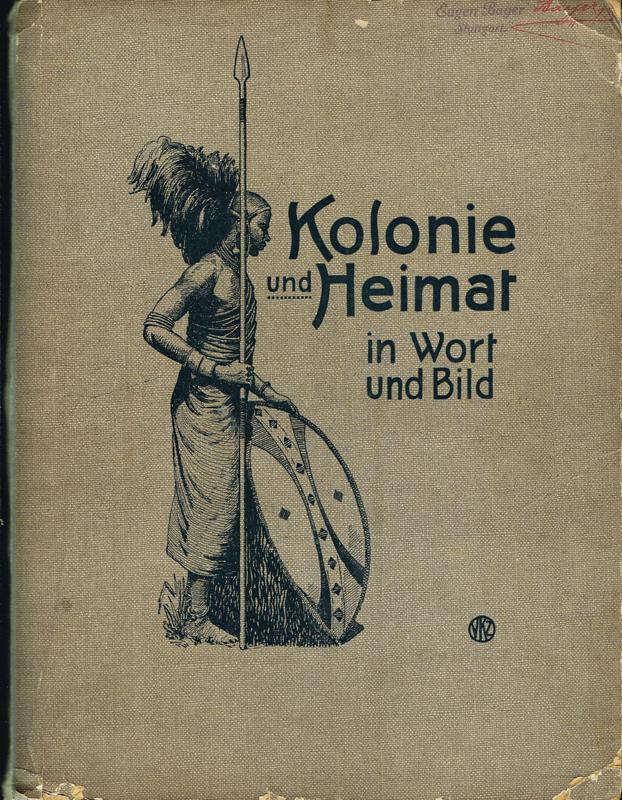Familiarizing the Colony: Distance and Proximity in Dutch and German Colonial Photography and Visual Culture
Workshop: Online Friday 2 July 2021, 09.30 - 16.00 hour

Kolonie und Heimat in Wort und Bild, Verlag kolonialpolitischer Zeitschriften, 3. Jahrgang, Berlin 1909
It is the aim of this workshop to explore this visual and discursive paradox by looking at German and Dutch colonial photography and visual culture between 1850 and 1950 from a comparative perspective. Also longterm, 21st-century situations will be highlighted.
The last – and most formative – century of European global colonialism coincided with a media-technological revolution that would change public images of the world forever: the invention of photography. While photographic images shaped all aspects of modern public and private life, it was of particular significance for colonial culture and imagination: overseas colonies were no longer just distant territories beyond the horizon but could now be looked at and visualized from home. This sudden nearness of colonized territories resulted in a visual culture that illustrated the very paradox of Europe’s global ambitions: on the one hand, the legitimization of colonialism relied on images of alterity of the non-Western World, on the other, new territories had to be familiarized and thereby claimed as part of the empire and the homeland.
It is the aim of this workshop to explore this visual and discursive paradox by looking at German and Dutch colonial photography and visual culture between 1850 and 1950 from a comparative perspective. In which ways was photography used to evoke a sense of familiarity between the colonies and the homelands and what was the specific purpose of this kind of familiarization? How and why were colonial territories depicted in terms of alterity and exotic imagination and in which ways were these two modes of representation related to each other? Imagination is not considered to pertain only to photographic representations but rather as a combination of text and image or other media since the colonial space was always constructed by different interconnected media. One avenue of thinking could draw in the concept of “Third Space” (Bhabha) but our approach is not limited to a single theoretical framework. Furthermore, long-term effects of colonial visualities into the twenty-first century will be approached from both artistic and academic angles.
These issues will be addressed in a selection of recent working papers and in a roundtable discussion atmosphere with researchers on all levels of their academic careers, from MA/resMA students, to artists, and to leading experts in their fields. Approaching this topic from a comparative Dutch-German perspective, the event will be online and hosted simultaneously from Leiden and Cologne. Students and scholars at all levels are cordially invited to attend and take part in the workshop.
Leonie Rupp, Jan Becker, Diana Natermann, Jens Jäger, and Johannes Müller
To register and to request the zoom details, please turn to the organisers.
Jan Becker: j.becker@umail.leidenuniv.nl
Johannes Müller: j.m.muller@hum.leidenuniv.nl
Programm
9.30: Introduction: Diana Natermann (Leiden University), Jens Jäger (University of Cologne)
9.45: Panel 1: Intermedial Perspectives
Lorena Rizzo (University of Basel):
“What Else Must I Say or Add?” – (In)audible Northern Namibian Pasts
Caroline Bräuer (Rautenstrauch-Joest Museum, Cologne):
“In Word and Image?” Visual Culture in the Magazine “Kolonie und Heimat”
Ana Carolina Schveitzer (Humboldt University, Berlin):
Framing Colonial Work Situation: Photographs from the Deutsche Kolonialgesellschaft (DKG) Archive
Comments: Ali Shobeiri (Leiden University)
12.00: Break
13.00: Panel 2: Visualizing Violence
Ceyda Ünlü (University of Cologne):
„Private Visual Reporting? Representations of the Herero-Nama War in Illustrated Postcards in Imperial Germany”
Liesbeth Ouwehand (Research Center for Material Culture, Amsterdam):
The Circulation of Atrocity: the Puputan Bali Case Study
Comments: Diana Natermann (Leiden University)
14.15: Coffee Break
14.30: Panel 3: Artistic Interventions
Vitjitua Ndjiharine (Akademie Schloss Solitude, Windhoek/Stuttgart):
German Colonialism and Namibian Art (working title)
Tim van den Hoff (Rotterdam):
‘The Images of Piet Hein: A Documentary About the History of an (Un)wanted Icon’
Comments: Johannes Müller (Leiden University)
15.45: Break
16.00: Panel 4: Long-Term Effects
Leonie Rupp and Jan Becker (Leiden University):
Putting Colonial Photography in Perspective: Investigating Transnational Visual Legacies
Diana Natermann (Leiden University):
(Post-)Colonial Images and How Museums Can Address their Heritages
Comments and Concluding Remarks: Jens Jäger (University of Cologne)
Kontakt
d.m.s.m.natermann@hum.leidenuniv.nl

